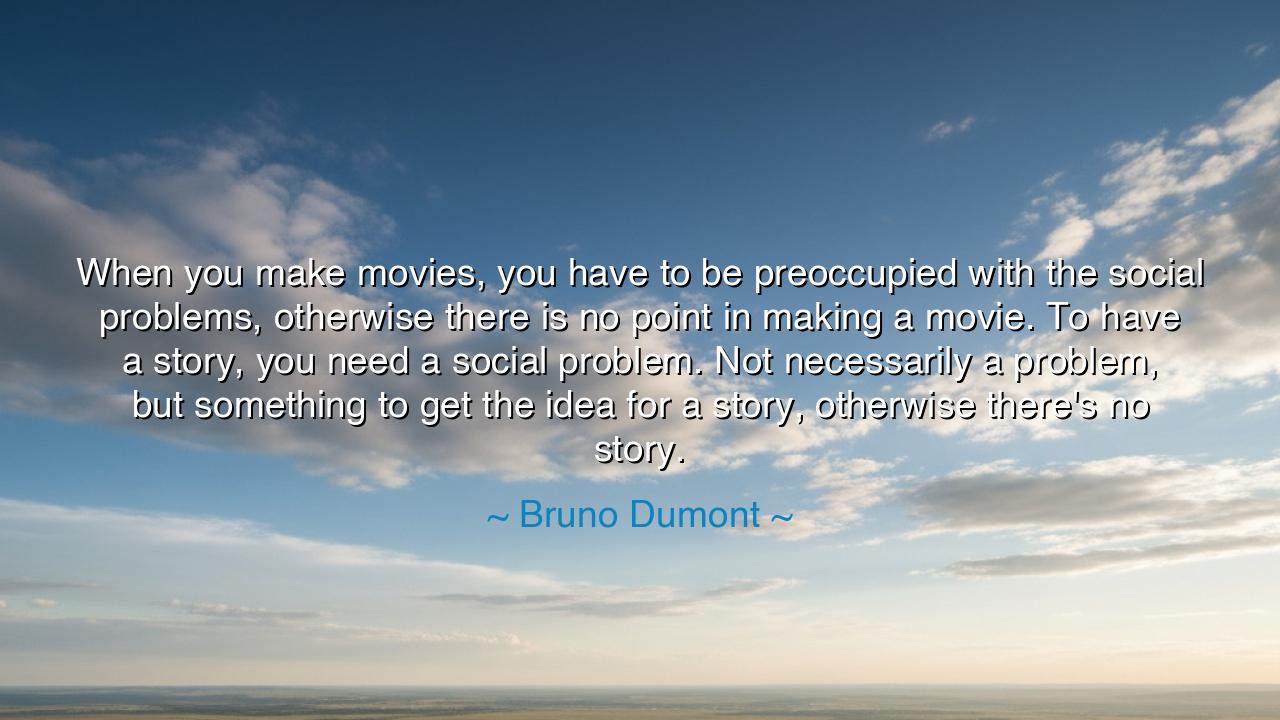
When you make movies, you have to be preoccupied with the social
When you make movies, you have to be preoccupied with the social problems, otherwise there is no point in making a movie. To have a story, you need a social problem. Not necessarily a problem, but something to get the idea for a story, otherwise there's no story.






Gather, O seekers of truth and understanding, for the words of Bruno Dumont carry the weight of deep wisdom and a call to purposeful creation: "When you make movies, you have to be preoccupied with the social problems, otherwise there is no point in making a movie. To have a story, you need a social problem. Not necessarily a problem, but something to get the idea for a story, otherwise there's no story." These words speak to the very heart of storytelling, and in them lies a truth that transcends cinema itself—a truth about the role of the artist in society, the importance of struggle, and the necessity of addressing the deeper issues that shape human existence.
In the ancient times, when the great playwrights and bards of the world crafted their epics and tragedies, they did so not for mere entertainment, but to explore the issues that plagued their societies. Sophocles, in his great tragedy Antigone, was not only telling a story of familial duty, but of the tension between the laws of man and the laws of the gods, a theme that spoke to the heart of human existence. The ancient Greeks knew that the best stories were those that reflected the struggles of the human soul—stories that were intertwined with the social problems and moral dilemmas of their time. Dumont echoes this ancient wisdom, reminding us that to create something meaningful, the artist must look to the struggles of their society, to the questions that stir the heart of their people.
In the same way, the Romans used the epic to not only recount the deeds of heroes but to question the foundations of their civilization. Virgil’s Aeneid, while telling the tale of Aeneas’ quest to found Rome, also explored the foundations of empire, the sacrifices of war, and the costs of conquest. These were not abstract ideas; they were real issues faced by the people of Rome—issues that were universal, that echoed through the ages. Dumont’s belief that stories must be rooted in social problems speaks to this same tradition: it is through the exploration of conflict and struggle that we come to understand life itself, and it is through these struggles that stories gain their depth and meaning.
To create a story without addressing some form of social tension or human conflict is, in Dumont's eyes, to create something empty. Without a problem—be it a moral dilemma, a political injustice, or the personal struggle of the protagonist—there can be no true story. Just as Homer’s Iliad did not shy away from the wrath of Achilles and the consequences of war, so too must modern filmmakers face the difficult realities of the world. Without this confrontation of reality, stories become nothing more than idle fantasies, disconnected from the human experience. To truly connect with an audience, a story must resonate with the real and the urgent, the questions that burn in the hearts of the people.
Think, O seekers, of the great novels of Charles Dickens, whose works such as A Tale of Two Cities were not only stories of individual characters, but reflections of the great social upheavals of his time. Dickens, like Dumont, understood that a story is not simply about the lives of individuals, but about the society they inhabit. The struggles of poverty, class, and revolution in his novels were deeply entwined with the personal fates of his characters. Dickens did not shy away from the social issues of his day—he used them as the very foundation of his art, to hold a mirror to society and ask the difficult questions that still echo through time.
Thus, the lesson for us all is clear: as creators, we must immerse ourselves in the issues that shape our world. To tell a story without confronting the real struggles of humanity is to create something shallow, something that does not touch the heart of life itself. Whether through film, literature, or art, the greatest creations are those that address the difficult, uncomfortable, and challenging aspects of our existence. Dumont’s wisdom calls us to be courageous in our work, to confront the problems of our time, not to shy away from them, but to use them as the foundation for our stories.
As you embark on your own creative journey, O future generations, remember this: art is not just an escape, but a reflection of the world in which we live. Do not be afraid to confront the difficult, the uncomfortable, the social problems that are woven into the fabric of your society. It is through this confrontation, through this engagement, that you will find stories that are not only meaningful but that resonate with the hearts of those who hear them. Just as the ancients used stories to question their world, so too must you use your creativity to engage with the world around you, to seek truth, and to create works that matter.






AAdministratorAdministrator
Welcome, honored guests. Please leave a comment, we will respond soon